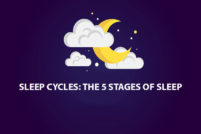Science has shown that our sleep-wake schedules go beyond a simple difference in preference: Our optimal schedule is actually part of our DNA.
If you find yourself feeling groggy and under-rested come the morning, it may be due to a conflict between your biological clock and your practiced daily routines. It’s possible that going to bed an hour earlier, or waking up an hour later, may be just the shift your body is asking for.
How Your Body Knows When It’s Time To Sleep
We all have a biological clock which has been keeping track of time since our birth.
Located deep within the brain, in a bundle of nerve cells called the suprachiasmatic nucleus (SCN), this master clock controls the regular changes in our physiological and mental state which occur throughout the day: our circadian rhythms. [1]
These changes affect everything from our body temperature, blood pressure, energy level, the release of hormones, our metabolism, cognition and-of course -our sleep.
Our biological clock is heavily dependent on stimuli from light – which travels from the eye, directly along the optic nerve to the SCN – to sync our sleep-wake schedule with day and night.
”Chrono-misalignment” occurs when our biological clock is not in sync with the schedule of our days (Such as when we are forced to work a night shift).
This leads to sleep disorders, and sleep deprivation, which, beyond exhaustion, has been linked with depression, anxiety and an increased risk of accidents.
The 4 Chronotypes That Define Your Sleep
Dr. Michael Breus is a clinical psychologist, sleep specialist, and the author of “Power of When:” a book in which he outlines his discoveries concerning our ideal sleep-wake schedules. [2]
According to Dr. Breus, there are four chronotypes (lion, bear, wolf, and dolphin) which dictate the best times for us to wake up, eat, work, sleep, amongst a myriad of other activities. [3]
Before this, chronotype was divided into only two categories: early birds and night owls. [4] Dr. Breus’ work has expanded on our understanding of biological rhythms and how they impact our individual preferences for sleep-wake schedules, as well as our behavior and personalities.
LION

- 15-20%
- Very early risers
- Most alert at noon
- Rarely nap
- Most productive in morning
- Fall asleep quickly
Personality traits: conscientious, stable, practical, optimistic
Behaviors: overachievers, prioritize health & fitness
Bedtime: 10pmWake Up: 5:30am – 6 am
BEAR

- 50% of population
- Take a few hours to feel fully awake
- Most alert mid-morning to early afternoon
- Most productive around noon
Personality Traits: cautious, extroverted, open-minded, friendly
Behaviors: Prioritize happiness, avoid conflict, prefers routine
Bedtime: 11pm
Wake up: 7 am
WOLF

- 15-20% of population”Night owls.”
- Most alert after 7 p.m.
- Difficulty waking up before midday
- Don’t feel tired before midnight
Personality Traits: Impulsive, creative, moody
Behaviors: Risk takers, prioritize pleasure, seek novelty
Bedtime: 12am
Wake Up: 7:30 am
DOLPHIN

- 10% of population
- Wake up feeling unrefreshed
- Light sleepers
- Frequently diagnosed with insomnia
- Most productive in spurts throughout the day
- Most alert late at night
Personality Traits: cautious, neurotic, introverted, intelligent
Behaviors: avoid risk, perfectionist, fixate on details
Bedtime: 11:30pm
Wake up: 6:30 am
Take the quiz on Dr. Breus’ website to find out what your chronotype is. After completing the quiz, you will receive a video going into more detail about your particular chronotype.
When To Sleep To Optimize Your Sleep Cycles
If you’re a wolf you’re going to be heading to bed later than a bear or a lion; however, there are some important facts about sleep cycles you should keep in mind when setting your sleep schedule.
Sleep occurs in approximately 90-minute long cycles throughout the night, during which we drift through periods of light sleep, deep sleep and REM sleep.
More importantly, the quality of our sleep changes throughout the night: The first half of the night is dominated by non-REM sleep, with consecutively longer periods of REM as morning approaches.
While REM sleep is integral for a multitude of cognitive processes and is the stage in which we dream; non-REM deep sleep is considered to be more restorative, and is what leaves us feeling well-rested upon waking.

image by healthcentral.com
The problem? Research shows that the switch from non-REM to REM sleep occurs at a particular time of night, independent of when you go to bed. This change takes place at approximately 3 am. [5]
So, wolves need to be wary of this and head to bed closer to the time recommended by Dr. Breus.
Listen To Your Body
Knowing your chronotype is all good and well, but sometimes it’s just not feasible for us to follow our ideal sleeping schedule: Shift work is a major contributor to the development of circadian rhythm disorders and sleep deprivation for this very reason.
Listen to the cues your body is sending you, and aim to get the recommended hours of sleep each night – even if that means heading to bed earlier than your chronotype might suggest.
Sleep is an essential aspect of our lives, and the quality and amount of sleep we get are integral to our health and well-being.





